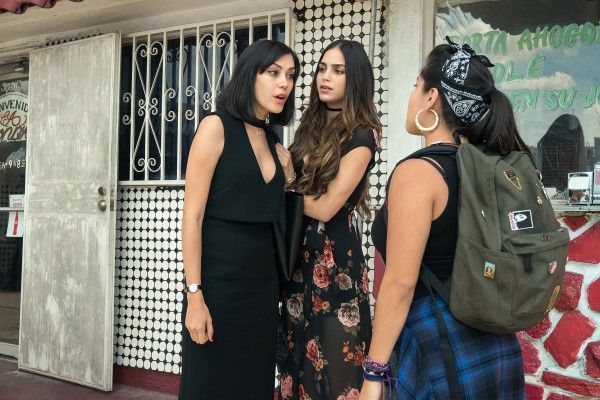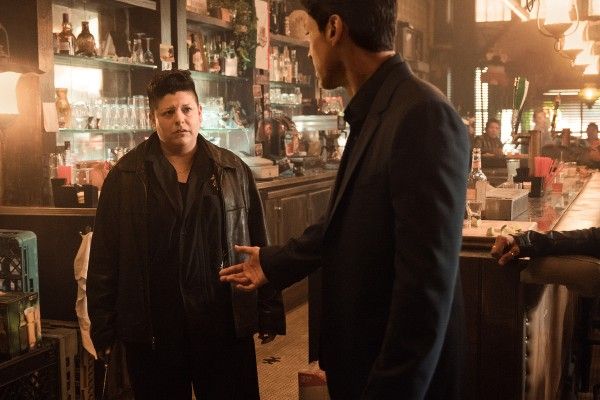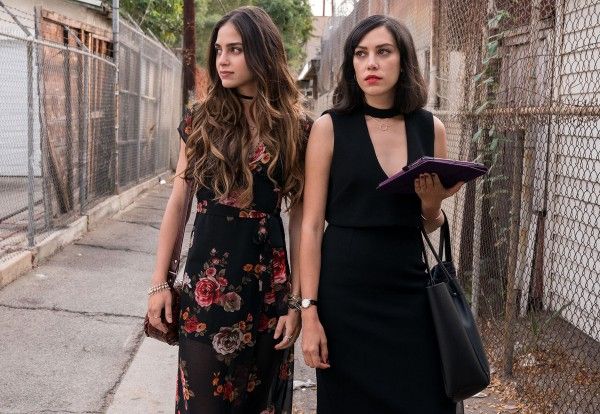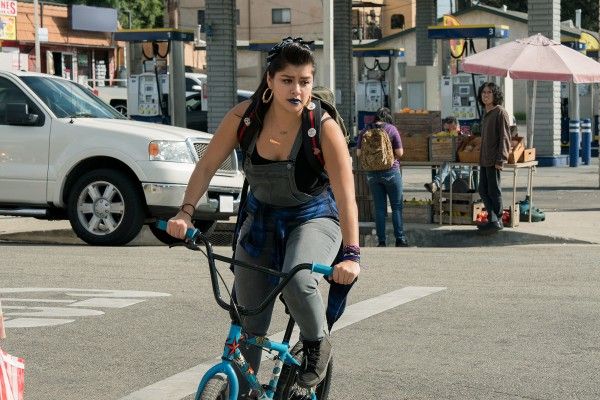One thing Starz’s new series Vida knows well is that going home is never easy. “It isn’t a homecoming until somebody calls you a puta,” says Emma Hernandez (Mishel Prada) to her younger sister Lyn (Melissa Barrera), who replies “Welcome the fuck home then!” The two girls are back in the East LA neighborhood where they grew up because their mother, Vida, has just died suddenly after an illness. Almost as soon as they arrive, they’re confronted by the fact that their mother was, unbeknownst to them, married — to Edwina or “Eddy” (played by non-binary actor Ser Anzoategui). As they process this and go to some of their old haunts, they’re called out by an aggressive young activist, Marisol (Chelsea Rendon), who refers to them not only as putas, but Chipsters, whitetinas, and other derogatory names to define them as no longer belonging to the neighborhood.
Vida revolves, completely, around identity. As Emma and Lyn are forced to deal with the broken relationships they had with their mother (and with each other), they also must choose who they are or who they want to be. Is Emma straight or queer? Does Lyn want to embrace being Mexican, or pass for white? Do they want to stay in LA and take over their mother’s failing bar, or sell it to predatory developers? Do they embrace the close-knit community that their mother’s bar has been a safe space for, or do they denounce them as freeloaders?
There are no easy answers to these questions, as Emma and Lyn both start to get pulled back into the neighborhood and its way of life, starting with some hook ups with old loves. Their mother’s spirit haunts the series, but her death or a feeling of grief is never an overwhelming presence. It takes the girls the full season (of six, half-hour episodes) to even begin to figure out what life might looks like post-Vida, and the payoff is satisfying (Prada, in particular, is very good at holding us at arm's length until she's ready to let us in). But in between, there’s a lot that Vida is also figuring out for itself. In many ways this first season feels like one long first act in a much bigger story about learning to define and embrace your identity.
In that way, Vida is similar to Starz’s other new half-hour series about a young woman finding herself (in New York, a decade earlier), Sweetbitter. But Vida is more grown-up — the stakes are higher, the language is harsher, and there is a lot of explicit sex and nudity. It also incorperates a little mysticism, and specifically looks to address the cultural shifts happening in old immigrant neighborhoods that happen to be prime real estate for in-town developments. That latter story isn’t presented with the same kind of nuance as the emotional arc of the sisters facing their past, but there are some interesting threads to it. A lot of that is thanks to Rendon’s compelling portrayal as the angry but not unreasonable Mari, though things like her secret activist meetings fall a little flat or don’t feel as authentic as other aspects of the show. Still, thanks to Vida’s strong cast, no matter where things go, it makes us want to follow.
What ultimately makes the series, which comes from Tanya Saracho, as interesting as it is, is its very clear point of view. It’s a little reminiscent of HBO’s Looking, which Saracho wrote for, as well as seminal Showtime series The L Word. However, it’s also a rare story from a Latina (or “Latinx”) point of view, one that is also heavily interested in telling the story of women who are gay or who are exploring. As Emma tells her sister, she doesn’t define herself any particular way. “I’m just me.” It’s a very necessary take, though it's just one of many leads the show is following, including investigations of sex and gender politics, threads of gentrification, and solid family drama. It’s all connected, and occasionally comes together beautifully, yet more often it’s fragmented.
One of the season’s best examples of these stories working together, though, is when hippie child Lyn (the very charming Barrera keeps Lyn from being a cartoon) — frustrated by her uptight sister’s behavior — goes on a shopping spree with her deceased mother’s credit cards, and ends up getting herself invited to a rich hipster party. There’s a Latina housekeeper there, and Lyn watches silently as the housekeeper is invisible to the white hosts and guests until someone needs her to clean up vomit. And though Lyn is young and beautiful and fully embedded in the party in that moment, she and the housekeeper end up taking the same bus home, back to East LA. The camera lingers on Barrera as Lyn clutches her bags with a far-away look. Which life does she really belong to? Later, she and Emma sit together on the rooftop of the bar and apartments that their mother owned, and watch the sun rise. Once they figure it out, the vida they want is theirs for the taking.
Rating: ★★★
Vida premieres Sunday, May 6th on Starz.






